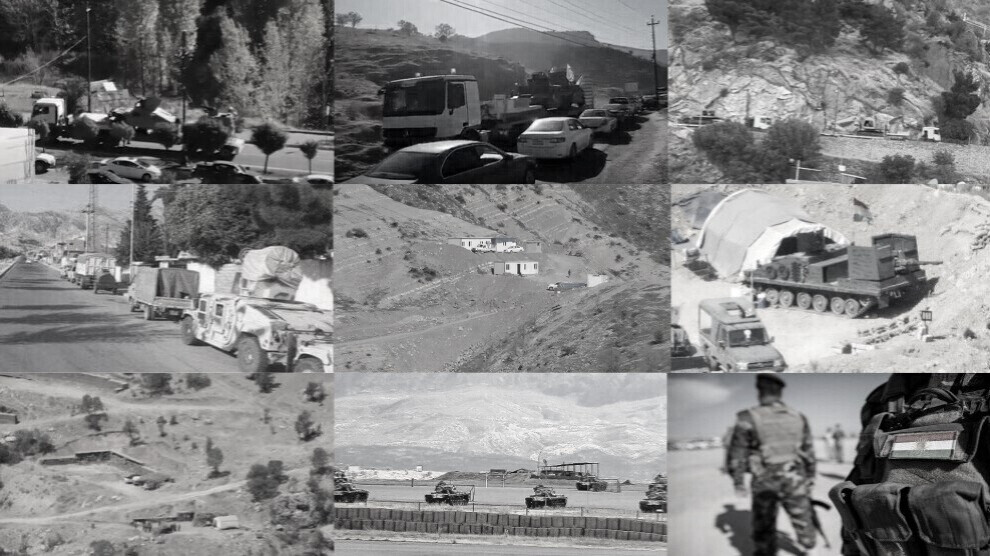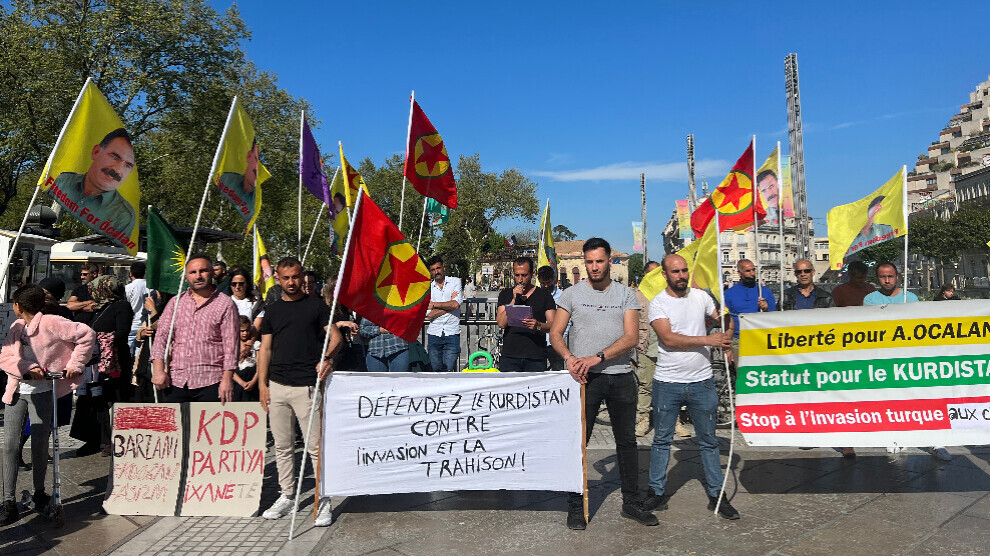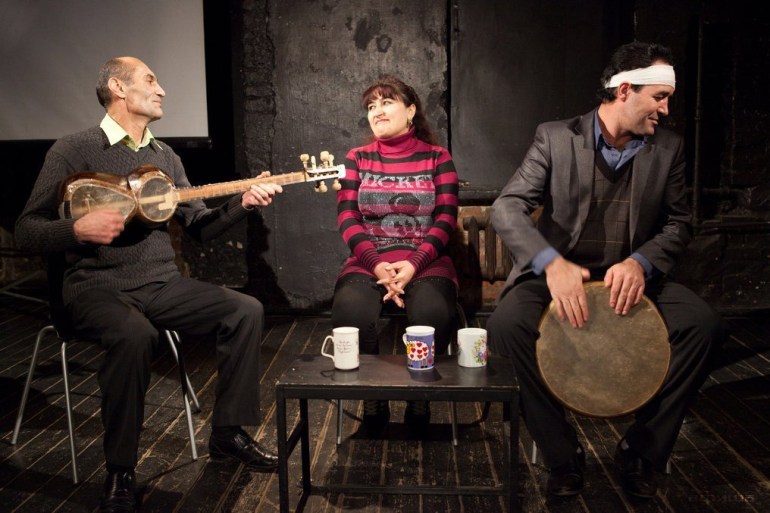Iraq condemns Turkish incursion in north against PKK fighters
Ankara launched a new air and ground offensive against the Kurdish rebels
:quality(70)/cloudfront-eu-central-1.images.arcpublishing.com/thenational/LNTIG2JZ3VS72AO7DPN7LZLE34.jpg)
Iraq has condemned Turkey’s latest military offensive on its northern territories against the outlawed Kurdistan Workers Party (PKK).
Ankara said early on Monday that it had launched an air and ground offensive against Kurdish fighters in Iraq's semi-autonomous Kurdish region.
At least 19 suspected Kurdish rebels were killed, while four Turkish soldiers were wounded, Turkey’s Defence Ministry said.
“Iraq categorically rejects, and strongly condemns, the military operations carried out by the Turkish forces by bombing Iraqi lands through helicopters and drones,” Iraqi Foreign Ministry spokesman Ahmed Al Sahaf said.
“Ankara’s actions violate the principle of good neighbourliness and Iraq will not be headquarters for harming any of its neighbouring countries.
“We refuse that Iraq becomes an area for conflict and for other countries to settle scores,” he said.
Populist Iraqi cleric Moqtada Al Sadr warned Ankara about its operations in the country
Mr Al Sadr said Iraq “will not be silent” if it continues to violate its sovereignty by bombing areas in northern Duhok province, part of the semi-autonomous Kurdish region.
“Neighbouring Turkey has targeted Iraq land unjustly and without pretext, and if [Turkey] has suspected any danger from Iraqi territory then it must coordinate with the Iraqi government to end its concerns as Iraqi security forces are capable of defending it,” Mr Al Sadr said.
“If this is repeated, then we will not remain silent, for Iraq is a fully sovereign country,” he said.
Turkish jets and artillery struck suspected PKK targets, while Turkish commandos — supported by helicopters and drones — crossed into the region by land or were airlifted by helicopters, Turkish Defence Minister Hulusi Akar said.
“Our heroic commandos and maroon berets — supported by attack helicopters, unmanned aerial vehicles, armed unmanned aerial vehicles — arrived on the scene by land and by air and captured the determined targets,” Mr Akar said. “Many terrorists were neutralised.”
“At this point we have reached, all planned targets have been captured,” he said.
Baghdad has repeatedly said that the presence of Turkish troops in the country was a “blatant breach of the UN charter” and was not authorised by the government.
Turkey has been fighting against the PKK for decades along its borders with Syria and Iraq.
The PKK has long used the rugged terrain of northern Iraq as a rear base to stage attacks in Turkey, which in turn set up military positions inside Iraqi territory.
Turkey and the PKK — considered a terrorist organisation by the US and the EU — have been fighting since 1984.
KNK calls on all governments and international organisations to take urgent action against Turkey’s violation of international law, to unambiguously condemn this crime of aggression, and to demand that Turkey withdraws its troops from South Kurdistan.

ANF
NEWS DESK
Monday, 18 Apr 2022, 14:41
The Executive Council of the Kurdistan National Congress (KNK) released a statement calling for action against Turkish aggression and occupation in the guerrilla-held Medya Defense Zones in southern Kurdistan (northern Iraq).
The statement released on Monday includes the following:
“While Turkish President Recep Tayyip Erdogan is trying to play the role of mediator in the Ukraine war and portray himself as a peacemaker, he has now launched a renewed, large-scale military offensive against South Kurdistan (northern Iraq), another unprovoked campaign by the Turkish Armed Forces to invade, depopulate, and occupy more of the area. Once again, the true face of Erdogan, that of an aggressor and occupier, can be seen in Kurdistan. A policy of denial and war against the Kurdish people is a central principle of the Turkish state and Erdogan’s leadership, and Erdogan’s transparent efforts to act as a mediator on the internal stage serve only to distract from the destructive role that Erdogan continues to play in Turkey, Kurdistan, and throughout the wider region.
On 17 April, the Turkish state launched a new military campaign aimed at occupying the areas of Şikefta Birîndara, Kurêjaro (Kurazhar) and Çiyayê Reş in the Zap region of South Kurdistan. In this illegal, cross-border campaign, the Turkish Armed Forces have been using heavy artillery, warplanes, drones and helicopters, and airlifting ground forces by helicopter into the region as part of a parallel ground offensive. From the region of Zap, the Turkish forces aim to extend their occupation further into the regions of Metîna and Avaşîn-Basyan.
The use of heavy weaponry and ground forces presents a grave threat to the entire region, and unity among Kurds in all parts of Kurdistan and the diaspora is the only answer to this aggression. The recent Newroz celebrations on 21 March featured a proclamation of a Kurdish national unity stance, and over 10 million Kurds in North Kurdistan and Turkey delivered a clear message to Erdogan that they will not bow to his brutality or policy of annihilation. Millions of Kurds have provided Turkey with a path to peace, and expressed to the peoples of Turkey and the world that the freedom of Kurdish People’s Leader Abdullah Öcalan will pave the way for peace in Turkey and beyond.
Appearances with certain Kurdish politicians from South Kurdistan will not help Erdogan hide his hostility towards the Kurdish people, as his track record of aggression against the Kurds in various parts of Kurdistan is well established. The recent Newroz celebrations showed the reality of Kurdish national consciousness and aspirations for freedom. Since Newroz, the torture and murder of Kurdish political prisoners has increased, as have attacks on offices of the progressive Peoples’ Democratic Party (HDP) and arrests of those who participated in Newroz celebrations. Meanwhile, in Rojava and North and East Syria, Turkish airstrikes against the Kurds have intensified.
Erdogan is now facing many domestic crises, including a dire economic situation, and is desperately trying to prevent his downfall by escalating the Turkish state’s war against the Kurds to rally nationalist support at home, while working to reinforce Turkey’s position in the international diplomatic arena by attempting to play the role of mediator in the Ukraine crisis and claim a unique geostrategic position between NATO and Russia. If the world continues to turn a blind eye to Erdogan’s aggression, we will see increased bloodshed, displacement, and instability throughout Kurdistan and the Middle East.
We must break the silence on Turkey’s invasion of South Kurdistan and take action!
We call on all governments and international organisations, including the UN, NATO, the EU, the Council of Europe and the Arab League, to take urgent action against this violation of international law, to unambiguously condemn this crime of aggression, and to demand that Turkey withdraws its troops from South Kurdistan.
We call on political parties, human rights organisations, organisations for peace, trade unionists and activists to oppose this Turkish aggression and occupation.”
After several days of air and ground attacks, the Turkish army has launched a new invasion of South Kurdistan. The umbrella organization KON-MED announces demonstrations throughout Germany.
The Turkish army has started a new invasion of South Kurdistan (Kurdistan region of Iraq) after several days of air and ground attacks. The occupation attacks, which began on the night between Sunday and Monday, interest the Medya Defense Areas controlled by the guerrilla forces. So far, the region Zap has been affected. KON-MED, the Germany-based umbrella organization of Kurdish associations, said that there will be demonstrations throughout Germany today.
"The Turkish government is trying to drive out the Kurdish population with its war and is striving for a permanent occupation and annexation of the region," explains Zübeyde Zümrüt, co-chair of KON-MED, adding that “Turkey's attacks violate international law and violate Iraq's sovereignty. The scientific service of the Bundestag already determined this during the attacks by Turkey on northern and eastern Syria in 2019.”
During the invasion carried out since April last year in the regions of Zap, Avaşîn and Metîna and during the attack on Gare, the Turkish army also used poison gas in South Kurdistan.
At least 367 such attacks against the Kurdish freedom movement and the population were registered in 2021, in addition to almost daily bombardments. Forty guerrillas lost their lives. Civilians were also affected by the use of banned chemical weapons.
With the recent invasion, the Turkish aggression against South Kurdistan has reached a new level. Other parts of civil infrastructure and the habitat of both people and animals have already been destroyed, and the new attacks are likely to trigger further exodus.
"As the umbrella organization of the Kurds living here in Germany, we strongly condemn these attacks by Turkey and call for an immediate end," explains Engin Sever, also co-chair of KON-MED, adding: "We call on the government of the Federal Republic of Germany to as Turkey's most important partner to end the war."
The invasion attacks by the Turkish state on Medya Defense Areas were protested in many cities of Europe. Thousands of people took to the streets underlining that they would never accept the betrayal of the KDP.

ANF
NEWS DESK
Tuesday, 19 Apr 2022, 07:49
The invasion attacks launched by the Turkish state in cooperation with the KDP in Avaşîn, Metîna and Zap regions were protested by Kurds and their friends in many European countries, especially in Austria, Denmark, France, Germany and Greece.
VIENNA
The attacks on Medya Defense Zones were protested in Vienna. Reacting to the attacks by the Turkish state and the KDP, the people of Kurdistan and their friends gathered in front of the Karlsplatz Opera and held a march and rally organized by the Vienna Democratic Society Center.
COPENHAGEN
The occupation attacks were protested in Copenhagen with a march. Speakers said that the betrayal of the KDP offered Kurdistan's gains to the Turkish state, and could never be accepted.
MONTPELLIER
In Montpellier, the Turkish state's invasion attacks and the cooperation of the KDP were protested at Comedie Square. Cevat Güneş said that the Turkish state and the KDP will never achieve their goal with these attacks.
LAVRIO
Tevgera Ciwanên Şoreşger (TCŞ) and the Kurdistan Cultural Association protested the invading Turkish army's attacks against Zap, Avaşin and Metina in cooperation with the KDP with a march in Lavrio camp in Greece. Hundreds of people joined the march.
FRANKFURT
Kurds participated in the peace action held in Frankfurt for Easter, and protested the attacks carried out by the Turkish state. Kurds and leftist organizations and unions also participated to the protest and demanded Germany's arms trade to end.
DORTMUND
In the city of Dortmund, people reacting to the invasion attacks by Turkey came together in front of the central station. A call was made to support the guerrillas' resistance.
DARMSTADT
Kurds living in Darmstadt and their friends protested the attacks launched by the invading Turkish state with the support of the collaborative KDP against guerrilla areas.
KASSEL
In the city of Kassel, the DKTM organised a demonstration at Königsplatz square to protest the attacks on Zap, Metîna and Avaşîn regions.
DÜSSELDORF
YJK-E and FED-MED Düsseldorf organized an action to protest the invasion attacks launched by Turkey with the support of the KDP.
The protest, attended by hundreds of people, was in front of the Hauptbahnhof.
























